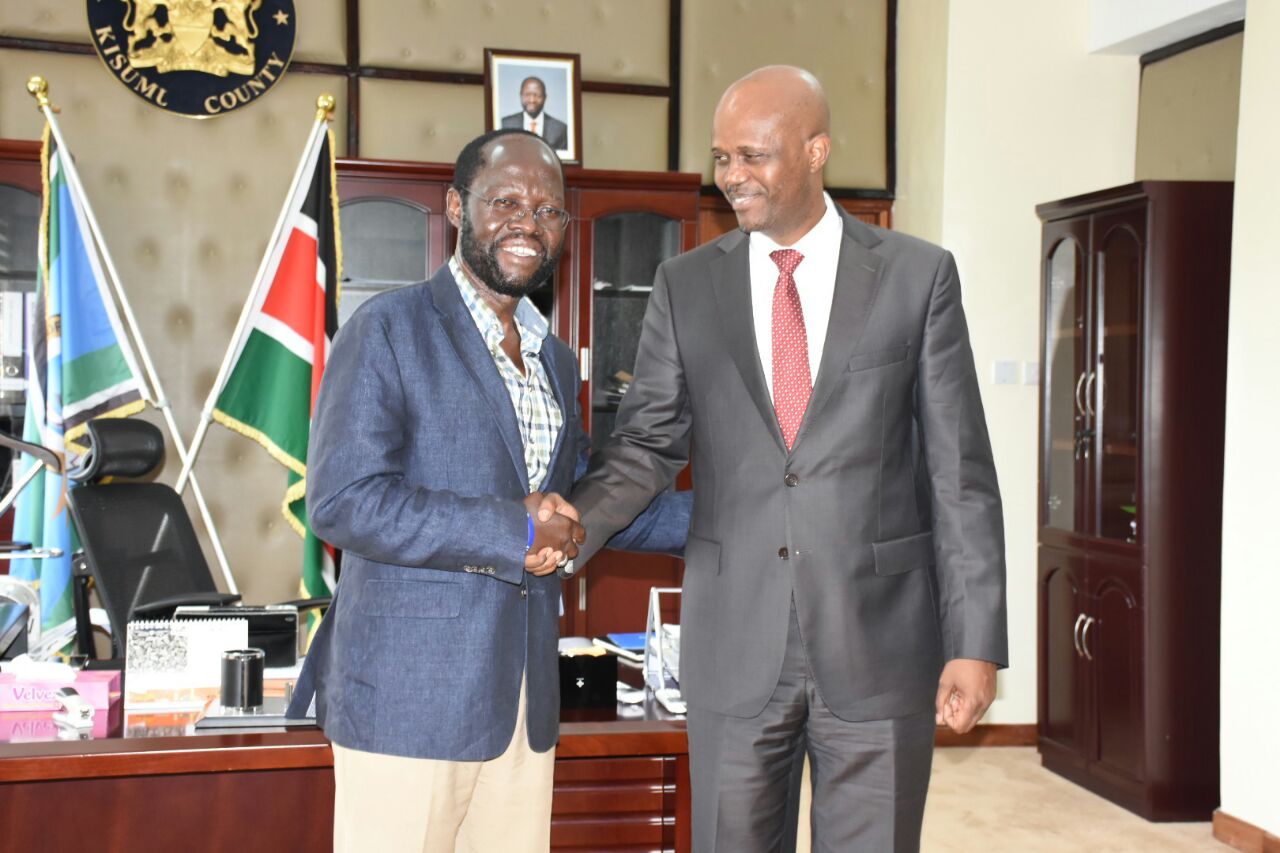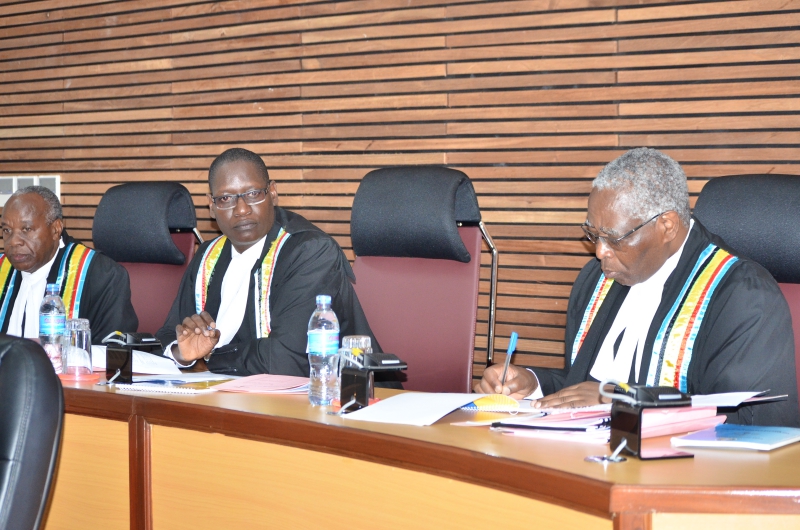
Boosting regional fish farming industry: Stakeholders workshop on the EU-EAC TRUE-FISH Programme
EAC Headquarters, Arusha, Tanzania, 23rd May 2018:
Today marked the launch of a two day workshop on regional aquaculture, under the title 'Stakeholders workshop on the EU-EAC TRUE-FISH Programme'.
The workshop is co-hosted by the East African Community (EAC), the Delegation of the European Union (EU) to Tanzania and to the EAC and the Lake Victoria Fisheries Organization (LVFO). It is also supported by two technical partners: the Food and Agricultural Organization (FAO) and WorldFish.
Addressing the media, EAC Secretary General Amb. Liberat Mfumukeko, said that despite efforts by riparian countries around Lake Victoria, measures to sustainably manage capture fisheries remained a big challenge with stocks of Nile Perch and Tilapia declining drastically.
“Notably, aquaculture in East Africa has not developed its potential and accounts for only 7-8% pf regional fish consumption. Overall demand for fish in the region is projected to rise substantially in the near future due to high growth, increasing incomes and urbanization. Developing aquaculture to meet the increasing demand for fish in East Africa is therefore crucial,” said Amb. Mfumukeko.
Amb. Mfumukeko disclosed that the five-year project would run from 2019 to 2024 with a budget of 10 million Euros from the European Development Fund, adding that this was a component of the 85 million Euros committed to EAC projects in agriculture, infrastructure, investment and private sector development by the EU.
Addressing the media, the Head of Delegation of the European Union to Tanzania and the EAC, H.E. Ambassador Roeland van de Geer reiterated the importance of fish farming having the potential to be a key driver for poverty eradication and sustainable development in the region: “Not only will fish farming help improve regional nutrition and food security. It will also provide new sources of rural income and contribute to contain pressure on the wild resources of the Lake Victoria”. He further stressed that the EU-EAC TRUE-FISH programme aims to tackle some of the key challenges as well as sustainability risks for the development of market-led, competitive and sustainable commercial aquaculture in the Lake Victoria basin.
The Country Director of WorldFish for Zambia and Tanzania, Mr Sloans Chimatiro, indicated that: “in the face of climate change, sustainable aquaculture practices offer water, energy and feed conversion efficiencies superior to any other domesticated animal food production system”.
The Executive Secretary of LVFO, Mr. Godfrey V. Monor, said that catches and biomass of fish in the lake and in particular Nile perch and Nile tilapia have declined and stressed that this has been accompanied by a corresponding reduction in per capita fish consumption. Consequently, he continued, “EAC Partner States are making efforts to put in place mechanisms to increase fish production through aquaculture. The LVFO, a specialized Institution of the EAC, coordinating the management and development of fisheries and aquaculture in the region, is spearheading this effort. LVFO has been instrumental in the development of the EAC Regional Strategy and Implementation Plan (2015–2020) for sustainable aquaculture and other documents providing inter alia for the establishment of harmonised legal frameworks. As well, it has been instrumental for the formulation of the EU-EAC TRUE-FISH Programme”.
The FAO Representative in Tanzania, Mr Fred Kafeero, stated that FAO has a long history in East Africa, particularly in fisheries and aquaculture on the Great Lakes. He said "Through its Sub-Committee for the Management of Lake Victoria, the Lake Victoria Fisheries Organization was established and inaugurated. As such the link between FAO and LVFO is a lasting one. Likewise FAO has strong links with WorldFish and has benefited from a long-standing relationship with the EU not only in fisheries and aquaculture, but in all aspects of food and agriculture-related aspects in rural development and beyond. All the right elements are there for a successful programme".
The main objectives of the workshop are to present and discuss the final design of the EU funded programme to the key stakeholders, place the programme in the context of wider fisheries and aquaculture topics of interest for the region, including on gender, and hold thematic working sessions to kick-off consultations for the preparation of implementing projects.
The workshop will be combined with Europe Day celebrations under the theme 'Gender and aquaculture'. Similar celebrations were marked on 9 May in Dar es Salaam and 17 May in Dodoma under the theme 'Gender and Agriculture. Europe Day commemorates the 'Shuman declaration' in 1950 when French Foreign Minister Robert Schuman set out his idea for a new form of economic, and political cooperation in Europe, which led in 1957 to the Treaty of Rome. The Treaty of Rome is one of the constitutional basis of the European Union and a pillar of peace and prosperity in the region.
NOTES TO EDITORS
The TRUE-FISH programme has a total estimated cost of EUR 10.15 million (Approximately TZS 28 billion) and a total amount of European Development Fund contribution of EUR 10 million (Approximately TZS 27. 6 billion) over the period of 5 years (2019-2024).
The programme aims to contribute in developing competitive, gender equitable and sustainable commercial aquaculture in the Lake Victoria basin.
It has three specific objectives:
1) BUSINESS: to improve access to commercial networks for aquaculture-related businesses
2) SKILLS: to increase availability and quality of local skilled workers for the development of aquaculture-related businesses
3) SUSTAINABILITY: to improve sustainability and bio-security of regional aquaculture production systems
Activities associated with the first specific objective include the establishment of a regular East African Aquaculture Exhibition and Conference, strengthening business linkages with the Egyptian and West African aquaculture sectors; and research and packaging of industry information.
The second specific objective covers the upgrading of practical training delivery by three Technical Vocational and Educational Training institutions (RIAT in Kisumu, FTI in Entebbe, and the FETA-NFFI in Nyegezi, Mwanza), and strengthening linkages between the training institutions, and with aquaculture business operators.
The third specific objective will work in areas related to strengthening aquatic animal health conditions, zoning of Lake Victoria, and protection of biodiversity.
Geographical scope: the programme focuses mainly on Lake Victoria and other lakes within its basin (Uganda, Kenya and Tanzania); components on aquatic animal health can be extended to other EAC Member States.
ENDS
For more information, please contact:
Mr Owora Richard Othieno,
Head of Department; Corporate Communications and Public Affairs,
East African Community Secretariat
Direct Line: +255 784 835021
Email: This email address is being protected from spambots. You need JavaScript enabled to view it.
Website: http://www.eac.int
Dr. Robert Kayanda,
Director of Fisheries Resources Monitoring and Research,
Lake Victoria Fisheries Organisation
E-mail: This email address is being protected from spambots. You need JavaScript enabled to view it.
Website: http://www.lvfo.org
Ms Susanne Mbise,
Press & Information Officer,
Delegation of the European Union to Tanzania and to the EAC
Email: This email address is being protected from spambots. You need JavaScript enabled to view it.
Website: http://eeas.europa.eu/delegations/tanzania/

